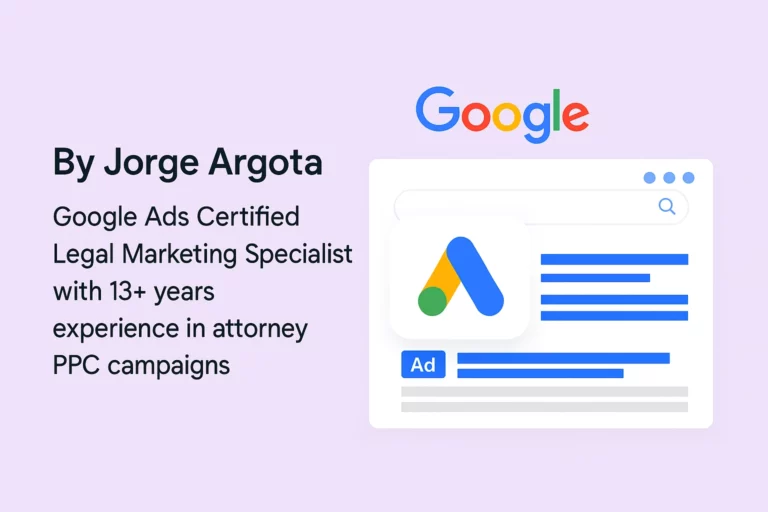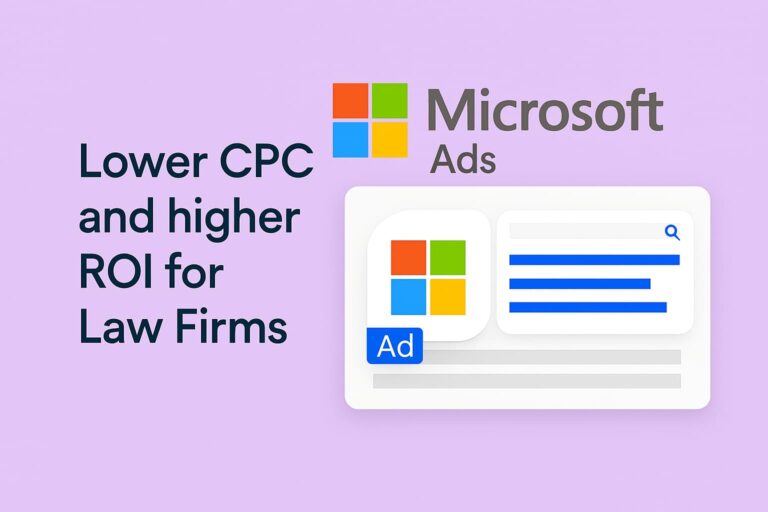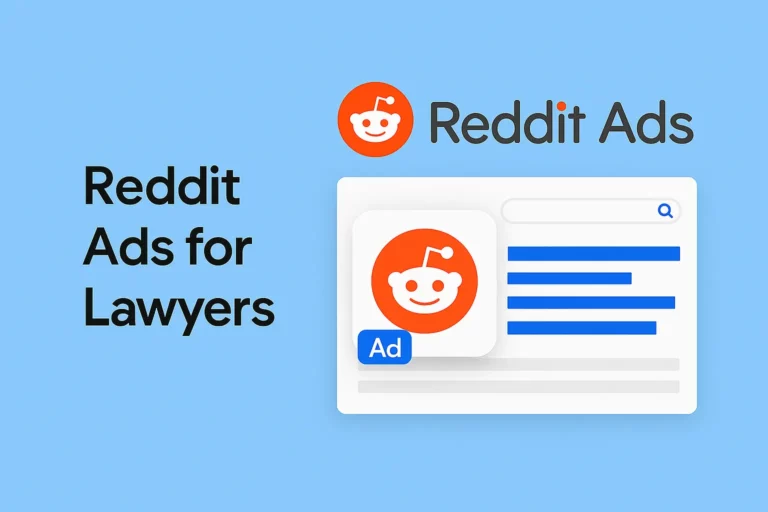English / Spanish
YMYL Content Creation Guide for Florida Attorneys: Standards, Best Practices, and SEO Strategy
Understanding YMYL in the Legal Context
As a Florida attorney, your online presence is more than just a marketing tool—it’s an extension of your professional practice subject to both ethical guidelines and search engine standards. Google classifies legal content as “Your Money or Your Life” (YMYL for lawyers), recognizing that inaccurate or misleading legal information from law firms could significantly impact a person’s financial stability, safety, or wellbeing.
This comprehensive guide bridges the gap between Florida Bar ethical requirements and Google’s YMYL content standards, providing actionable content strategies for law firms to create website content that not only ranks well in search results but upholds the highest standards of professional responsibility within the legal profession. Law firms that successfully implement these strategies find their law firm’s website performing better in search engine results pages while maintaining ethical compliance.
The legal services industry is highly competitive online, with law firm marketing often focused on achieving visibility in google search results. However, effective digital marketing for attorneys must balance optimization with ethical responsibilities unique to the legal profession.
Who, How, and Why of Your Content
Following Google’s guidance on content evaluation, law firms should consider the “Who, How, and Why” framework when creating content:
Who created the content? Your law firm’s website content should clearly indicate the specific attorney author with their credentials and experience in the relevant practice area. This transparency builds trust with both potential clients and search engines. Law firms that clearly attribute their content perform better than those with anonymous law firm website content.
How was the content created? Law firms must be transparent about their content creation process, especially if using AI assistance for drafting. Explain how your law firm’s website ensures accuracy and relevance in your legal content, including your keyword research methodology and update practices.
Why was the content created? Your primary purpose should be to help your target audience understand legal issues and procedures—not merely to manipulate search engine rankings. Content created primarily to attract search traffic without providing substantive value fails both ethical and quality standards. Successful law firms focus on creating genuine value through their law firm’s website.
What Makes Legal Content YMYL?
Google defines YMYL topics as those that “could potentially impact a person’s happiness, health, financial stability, or safety.” Legal content falls squarely into this category, particularly under the subcategory of “civics, government, and law” which includes information about voting, government agencies, and public institutions; social services guidance; legal advice on matters such as divorce, child custody, creating a will; and information about legal rights, citizenship, and other civic topics.
Law firms must understand that YMYL classification means your law firm’s website content is held to higher quality standards than non-YMYL content. This is where E-E-A-T becomes critical. Law firms that properly understand these heightened standards can develop web content that both serves prospective clients and satisfies search engines’ quality criteria.
The Critical Connection Between YMYL and E-E-A-T
E-E-A-T (Experience, Expertise, Authoritativeness, and Trustworthiness) is the specific framework search engines use to evaluate whether YMYL content meets heightened quality standards. Think of YMYL as the “what” and E-E-A-T as the “how”:
Here’s a visual representation what the connection of YMYL and E-E-A-T:
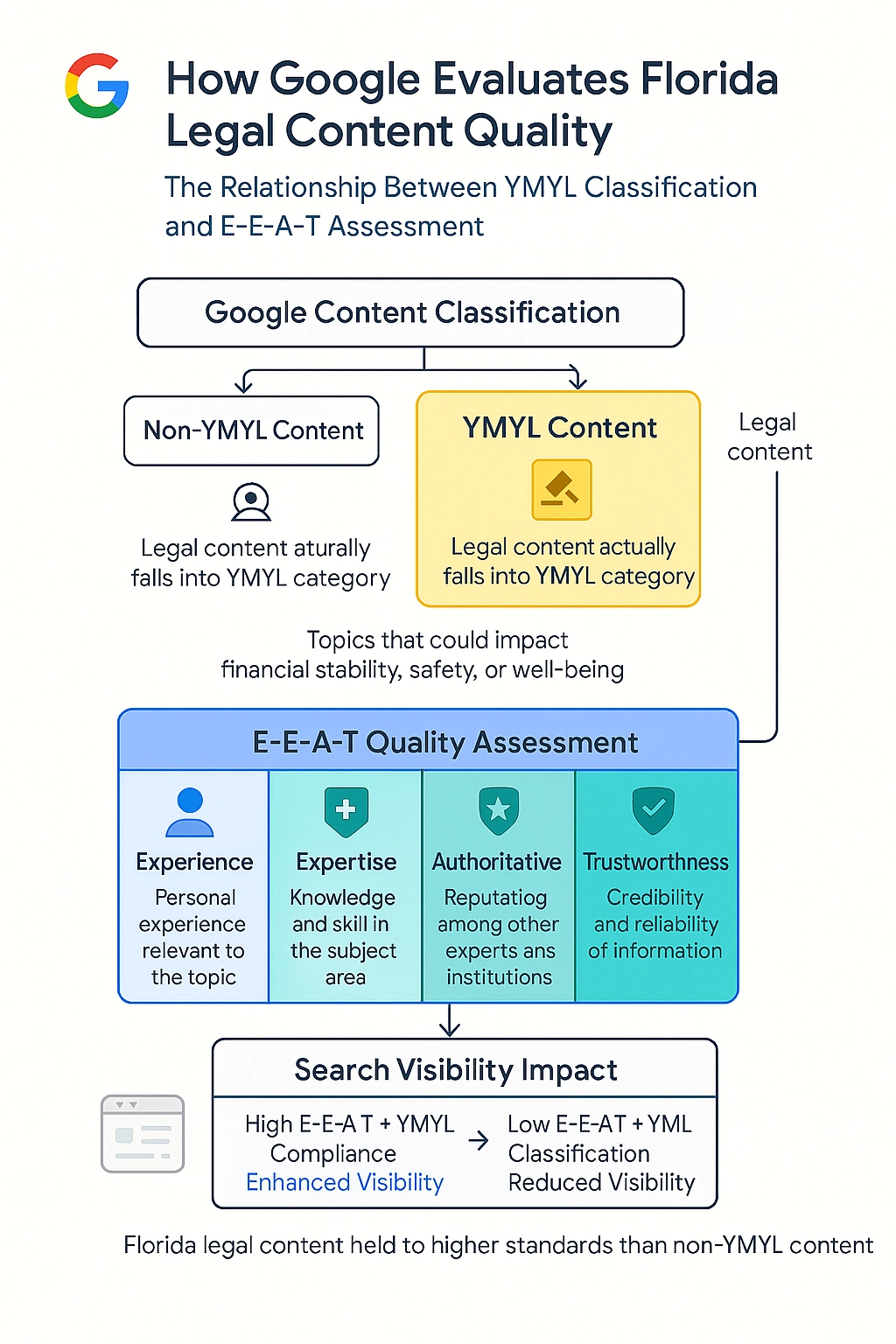
For law firms, this means your content isn’t just subject to ethical rules from the Florida Bar—it’s also being evaluated through Google’s E-E-A-T lens specifically because it’s categorized as YMYL content. Law firms must recognize how their law firm’s website is being assessed under this dual framework.
This connection is particularly important for law practice because:
- Search engines apply E-E-A-T evaluations with greater rigor to YMYL topics than to non-YMYL topics
- Poor E-E-A-T signals on legal content can significantly impact visibility in search results
- The same credentials and expertise that satisfy Florida Bar requirements can be leveraged to demonstrate E-E-A-T
Understanding this relationship allows criminal defense law firm and personal injury lawyers to create content strategies that simultaneously fulfill professional ethical obligations and satisfy search engines’ quality standards for sensitive legal matters. Prospective clients benefit from this approach as well, as they encounter more reliable information from law firms online.
The Dual Framework: Florida Bar Ethics and Google’s E-E-A-T
Florida Bar Ethical Requirements for Online Content
The Florida Bar’s Rules of Professional Conduct establish clear guidelines for attorney communications, including website content. Rule 4-7.12 requires that law firms clearly identify at least one lawyer responsible for the communication, prominently display the law firm name, and disclose office location by city or town.
Rule 4-7.13 prohibits deceptive and misleading statements, requiring that law firms ensure their web pages must not contain material misrepresentations of fact or law, cannot omit facts necessary to make the communication considered as a whole not misleading, and must be objectively verifiable.
When addressing potentially misleading information under Rule 4-7.14, law firms must be careful with client testimonials and endorsements (requiring specific disclaimers), use restrictions on terms like “specialist” and “expert” unless board certified, and adhere to limitations on past results presentation. Law firms that violate these guidelines risk disciplinary action regardless of how well their law firm’s website may perform in search rankings.
Additionally, confidentiality requirements under Rule 4-1.6 mean law firms cannot disclose client information without informed consent, necessitating careful handling of case studies and success stories to maintain client confidentiality. This applies to all content on a law firm’s website, including blog posts and practice area pages.
Disclaimer: This guide provides general information only and is not legal advice. All content strategies discussed here must comply with the Florida Bar’s Rules of Professional Conduct, including Rules 4-7.12 through 4-7.14 and 4-1.6. Florida attorneys remain solely responsible for ensuring their online content meets all ethical requirements regarding attorney identification, misleading statements, testimonial usage, specialization claims, and client confidentiality. Always consult the complete Rules Regulating the Florida Bar or contact the Ethics Hotline (800-235-8619) for specific compliance questions.
Google’s E-E-A-T Framework for Evaluating YMYL Content
While the Florida Bar’s rules focus on ethical compliance, Google’s E-E-A-T framework addresses quality assessment specifically for YMYL content. For personal injury lawyers and other legal professionals, understanding this framework is essential because legal services content automatically falls under YMYL scrutiny.
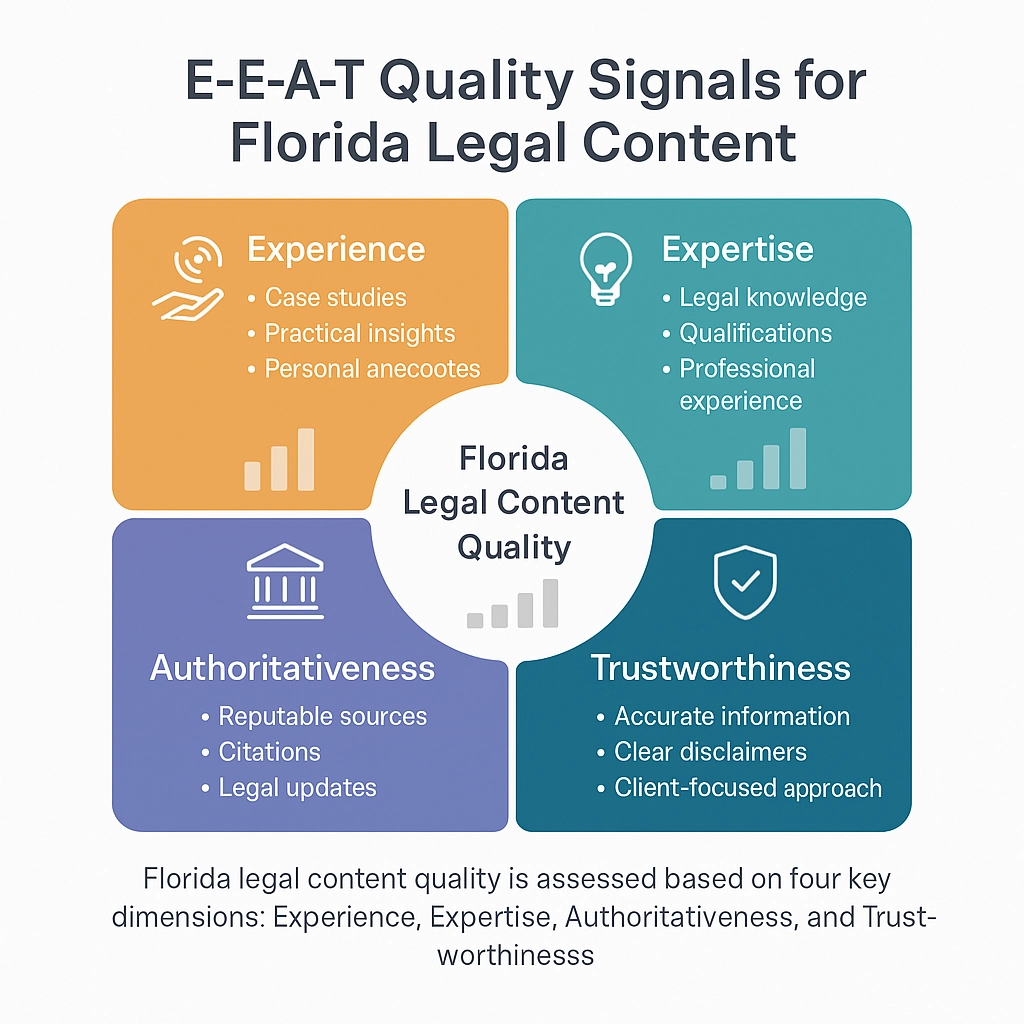
The four components of E-E-A-T work together to determine if your legal content meets Google’s heightened standards for YMYL topics:
Experience: This recently added component evaluates whether content demonstrates first-hand, practical experience with the legal topic. For law firms, this means showing that you’ve actually handled cases in the specific practice area you’re discussing—not just theoretical knowledge. Examples include discussion of procedural nuances that only come from actual courtroom experience, insights into how specific Florida judges or counties handle particular matters, and practical challenges and solutions from real client cases (shared ethically).
Expertise: This evaluates your professional qualifications and depth of knowledge in the legal field, particularly specialized knowledge in Florida-specific laws and procedures. For attorneys, expertise signals include Florida Bar credentials and years of practice, board certifications and specializations, advanced degrees or specialized training, and publication history in legal journals.
Authoritativeness: This assesses recognition within the legal community and external validation of your expertise. For law firms, authority signals include citations from other authoritative legal sources, recognition by Florida Bar associations, speaking engagements at legal conferences, media appearances as a legal expert, and peer endorsements from respected attorneys.
Trustworthiness: This evaluates the accuracy, currency, and transparency of your legal information. For YMYL content, trustworthiness is particularly crucial and includes regular updates to reflect changes in Florida law, clear citations to relevant statutes and cases, transparent authorship and credentials, appropriate disclaimers about the limits of general information, and security measures protecting client information.
Understanding how these E-E-A-T components specifically apply to legal content allows attorneys to create YMYL for lawyers content that satisfies both ethical requirements and quality standards.
Content Creation Best Practices for Florida Attorneys
People-First Content Approach
Before diving into specific strategies, law firms must embrace a people-first content philosophy. Successful law firms ask themselves these essential questions from Google’s own guidelines:
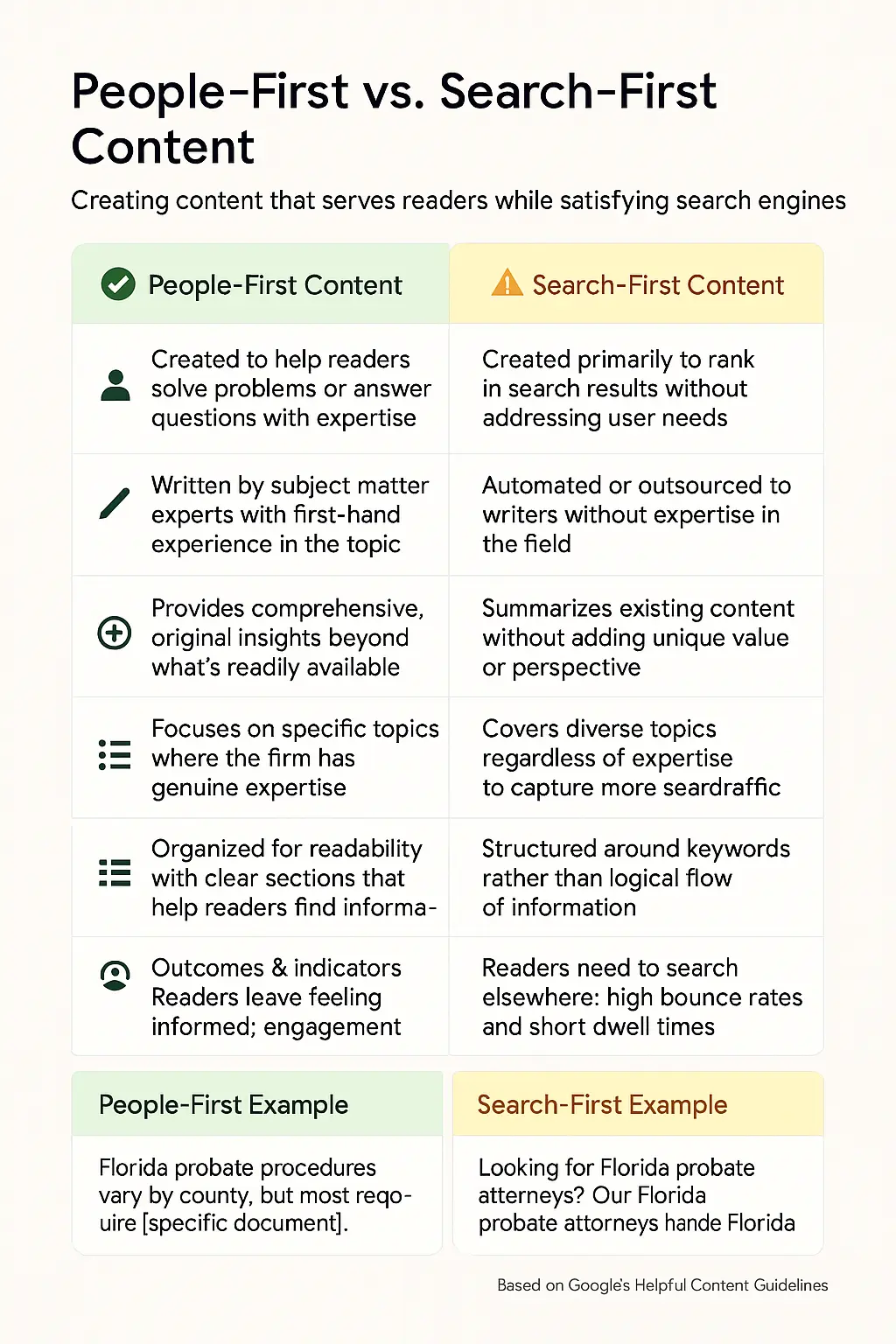
- Do you have an existing or intended audience (Florida residents with specific legal needs) who would find your content useful if they came directly to your law firm’s website?
- Does your law firm’s website content clearly demonstrate first-hand expertise based on actual legal practice experience in Florida?
- Does your firm’s website have a primary purpose or focus, rather than attempting to target disparate topics?
- Will someone reading your law firm content leave feeling they’ve learned enough about a Florida legal topic to help achieve their goal?
- Will prospective clients visiting your site have a satisfying experience that makes them feel their time was well spent?
If law firms can answer “yes” to these questions, they’re on the right track with a people-first approach that aligns with both ethical standards and search engine optimization. Law firms that prioritize user experience over quick SEO tricks build sustainable online presences that attract qualified prospective clients.
For a more detailed checklist download the people first content checklist PDF
What to Avoid in YMYL Legal Content
Equally important is understanding what practices to avoid. Law firms should recognize that their law firm’s website content may fail both ethical and quality standards if:
- It’s primarily created to attract search visits rather than inform your audience
- Your law firm is producing content on many different legal topics without genuine expertise in those areas
- Law firms are using extensive automation to produce content without adequate oversight
- Your law firm is mainly summarizing other sources without adding value from your legal expertise
- Law firms are writing about trending legal topics solely because they might generate traffic
- Your law firm’s website content leaves readers feeling they need to search elsewhere for better information
- You’re writing to hit arbitrary word counts rather than comprehensively address the topic
- Law firms are changing publication dates to make content appear fresh without substantive updates
Many law firms fall into these traps while trying to compete in search rankings, but these short-term tactics ultimately undermine both visibility and credibility.
1. Authorship and Credentials Transparency
Both Florida Bar rules and Google’s E-E-A-T guidelines emphasize the importance of clear attribution. Law firms should include detailed attorney bio pages with Florida Bar number and admission date, education credentials, practice area specializations (using permissible language), board certifications (if applicable), and professional associations and memberships.
Law firms must use bylines on all content with links to author profiles and consider adding professional headshots to increase trust signals. These elements not only satisfy ethical requirements but also enhance the perceived expertise of your law firm’s website content in search engines’ assessment. Savvy law firms understand that these transparency elements serve dual purposes: building trust with prospective clients while sending positive signals to search engines about the authoritativeness of their law firm’s website.
2. Focus on Florida-Specific Legal Information
Localized content demonstrates expertise in state-specific laws while aligning with search intent. Law firms should address Florida-specific statutes, case law, and procedures in their law firm content. Rather than publishing generic legal information, explain how broadly applicable legal concepts specifically operate under Florida law.
Law firms that reference Florida court decisions and their implications, and stay current with recent legal developments affecting their practice areas gain advantages in both expertise signaling and search visibility. This approach not only differentiates your law firm’s website content but also better serves your potential clients by providing information directly relevant to their jurisdiction. Leading law firms understand that locally-relevant legal content performs better with both search algorithms and prospective clients seeking location-specific guidance.
The best law firms recognize that providing specialized legal services information tailored to Florida residents creates more relevant content that performs better in search engine results pages. Digital marketing for legal services should emphasize geographic specificity rather than generic legal guidance available on national websites.
3. Substantive Depth and Accuracy
Superficial content fails both ethical and quality guidelines. Law firms should create comprehensive resources on specific legal topics that provide genuine value beyond surface-level information. Include citations to relevant Florida statutes and case law, and update your law firm’s website content regularly to reflect current law.
The best law firms provide practical insights beyond what’s readily available elsewhere, and structure law firm content logically with clear headings and subheadings. This approach satisfies search engines’ quality standards while fulfilling your ethical obligation to provide accurate, helpful information.
Local SEO for law firms also comes into play here, as search engines favor content that demonstrates deep local knowledge and expertise. By creating high quality content specific to Florida legal issues, law firms signal to search engines that their firm’s website is an authoritative source for local legal matters. Law firms that invest in creating substantive, in-depth content typically outperform competitors who publish thin, generic content across their law firm’s website.
4. Clear Disclaimers and Limitations
Florida Bar rules require clarity about what constitutes advertising versus legal advice. Law firms should include prominent disclaimers that their law firm content is for informational purposes only and clarify that content does not establish an attorney-client relationship. Note that legal issues vary and personalized advice requires consultation, and make transparent any jurisdictional limitations to your guidance.
These disclaimers protect both law firms and their readers by establishing appropriate expectations about the nature and limitations of the information provided. Forward-thinking law firms understand that clear disclaimers not only satisfy ethical requirements but also build trust with prospective clients visiting their law firm’s website by demonstrating transparent business practices.
5. Ethical Case Studies and Results Presentation
Florida Bar rules place specific limitations on how law firms can discuss past results. Always maintain client confidentiality and include appropriate disclaimers regarding the non-predictive nature of past results. Law firms should present outcomes factually without exaggeration and consider using anonymized composite examples where appropriate.
Focus on the legal strategies and principles rather than specific dollar amounts. This approach allows law firms to showcase their experience while remaining within ethical guidelines for attorney communications. Ethical law firms understand that while case results can be powerful marketing tools on their firm’s website, they must be presented with appropriate context and disclaimers to avoid misleading prospective clients about likely outcomes.
Effective Visual Content Strategy for YMYL Legal Topics
Visual elements are essential components of effective YMYL content, serving both to enhance understanding and demonstrate expertise. Law firms should strategically incorporate the following visual elements:
Informational Graphics for Legal Processes
Create custom flowcharts and diagrams that visualize Florida-specific legal processes. For example, develop a timeline visualization of the Florida divorce process, showing mandatory waiting periods, filing deadlines, and court appearances. Or create a visual hierarchy of Florida courts showing their jurisdictional boundaries and appeals pathways.
These visual elements not only improve user understanding but also signal your expertise in Florida-specific procedures. Include your firm’s branding and a citation to relevant Florida statutes to reinforce both your brand and the accuracy of the information.
Below is an example of what it should look like, in this example we used a probate administration infographic:
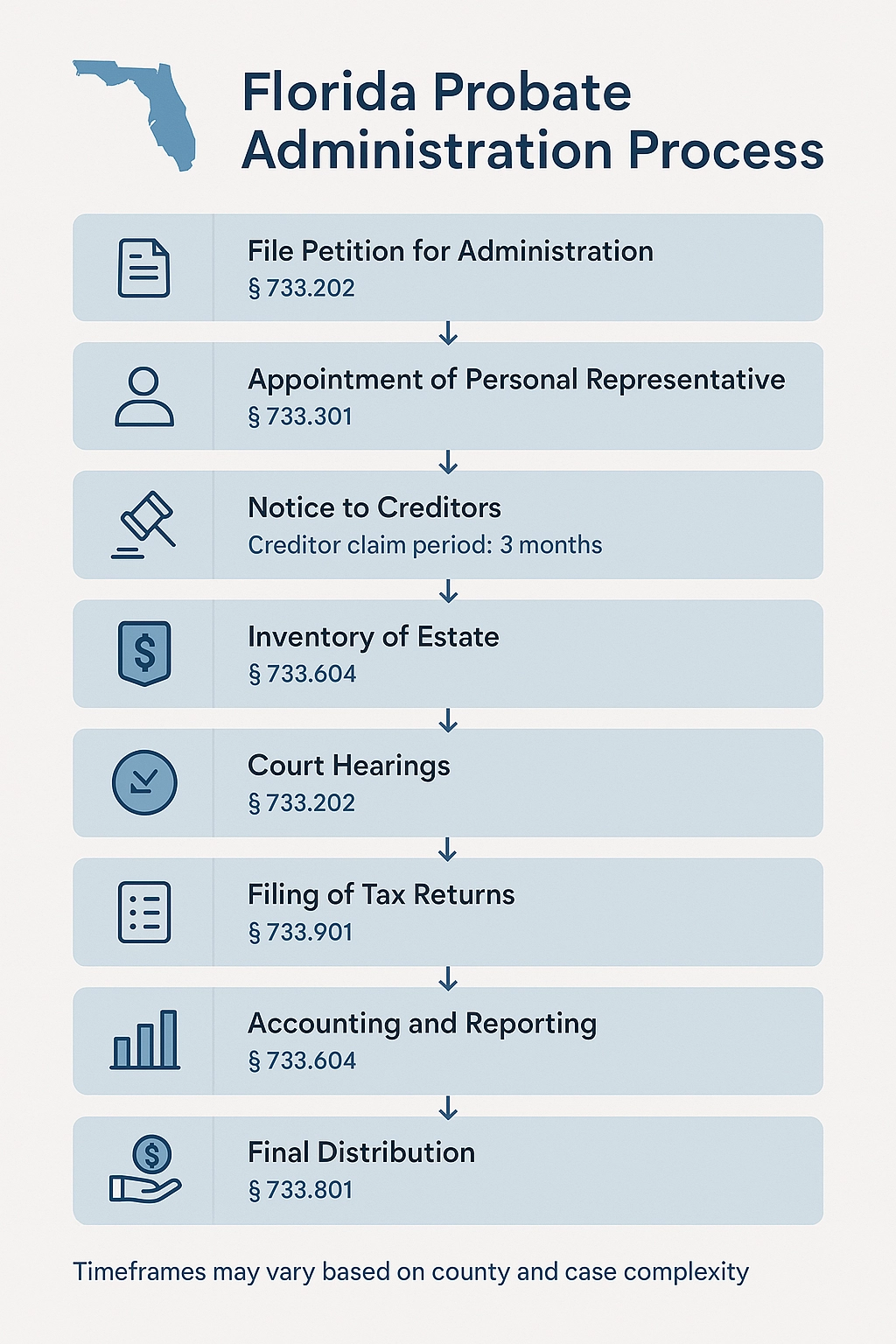
Data Visualizations for Legal Trends
Develop branded charts and graphs representing Florida legal data such as county-by-county statistics relevant to your practice area, timeline graphs showing changes in Florida law over time, or comparison charts of Florida vs. federal provisions on key legal issues.
These visual elements demonstrate your firm’s analytical capabilities and investment in providing substantive, data-driven information. Always include data sources and dates to enhance credibility and comply with ethical standards for verifiable information. Below is an example of how it should look like:
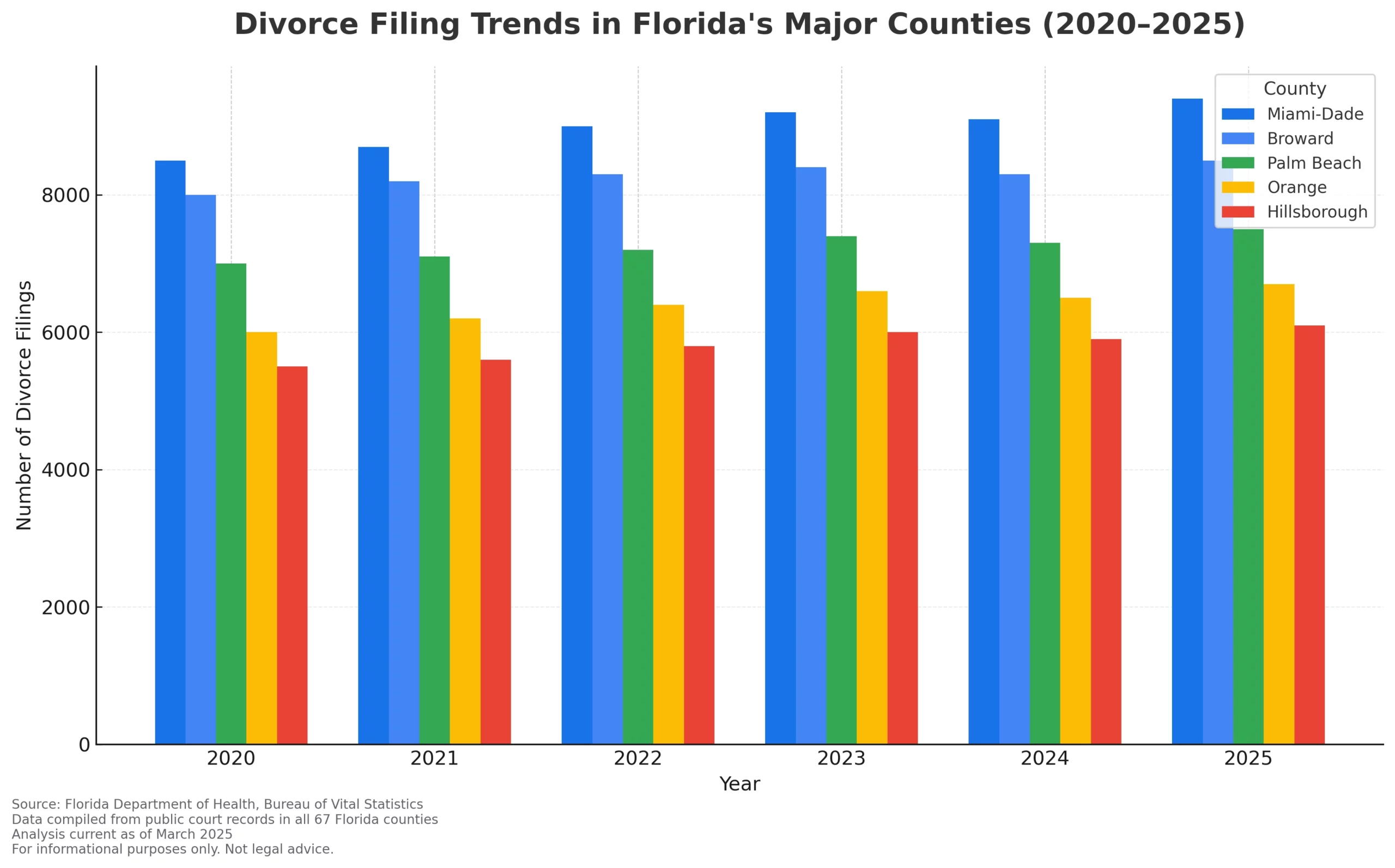
Bio-Enhancing Visuals
Professional photography of attorneys in appropriate settings can significantly enhance E-E-A-T signals. Include consistent, high-quality headshots of all attorneys featured in bio pages. Consider including contextual photography showing attorneys in professional settings such as courtrooms, conference rooms, or community events.
Visual indicators of credentials are also valuable, such as displaying Florida Bar certification logos, professional association emblems, and award recognitions. These visual elements reinforce expertise and authority while providing visual relief from text-heavy content.
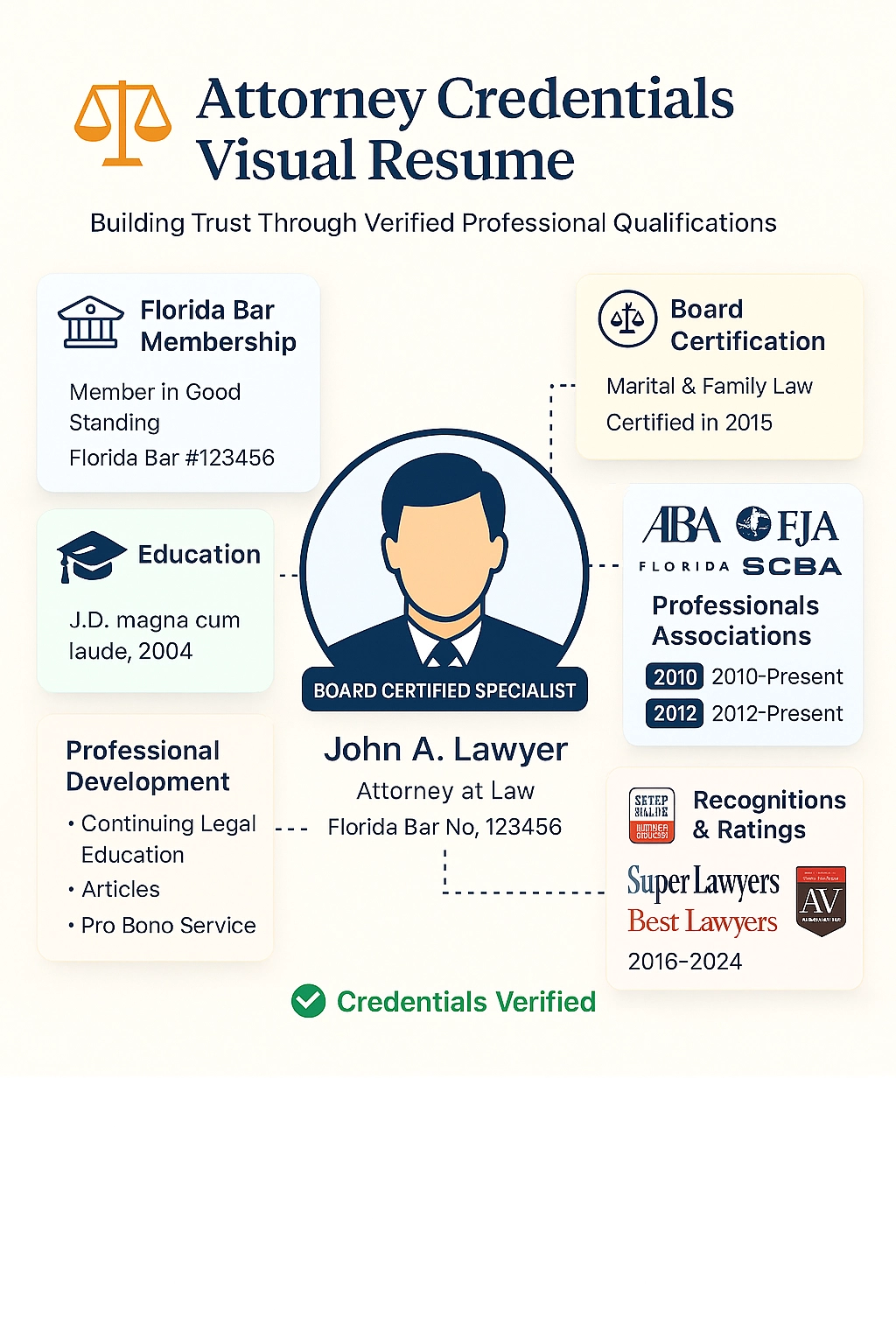
Custom Legal Diagrams
Develop unique visual explanations of complex legal issues relevant to Florida law. For example, create property division diagrams for Florida divorce cases, liability flow charts for Florida personal injury scenarios, or visual breakdowns of Florida business entity structures.
These custom visuals add significant value to your content while demonstrating your ability to make complex legal concepts accessible to clients. They also provide excellent opportunities for internal links to related practice area pages.
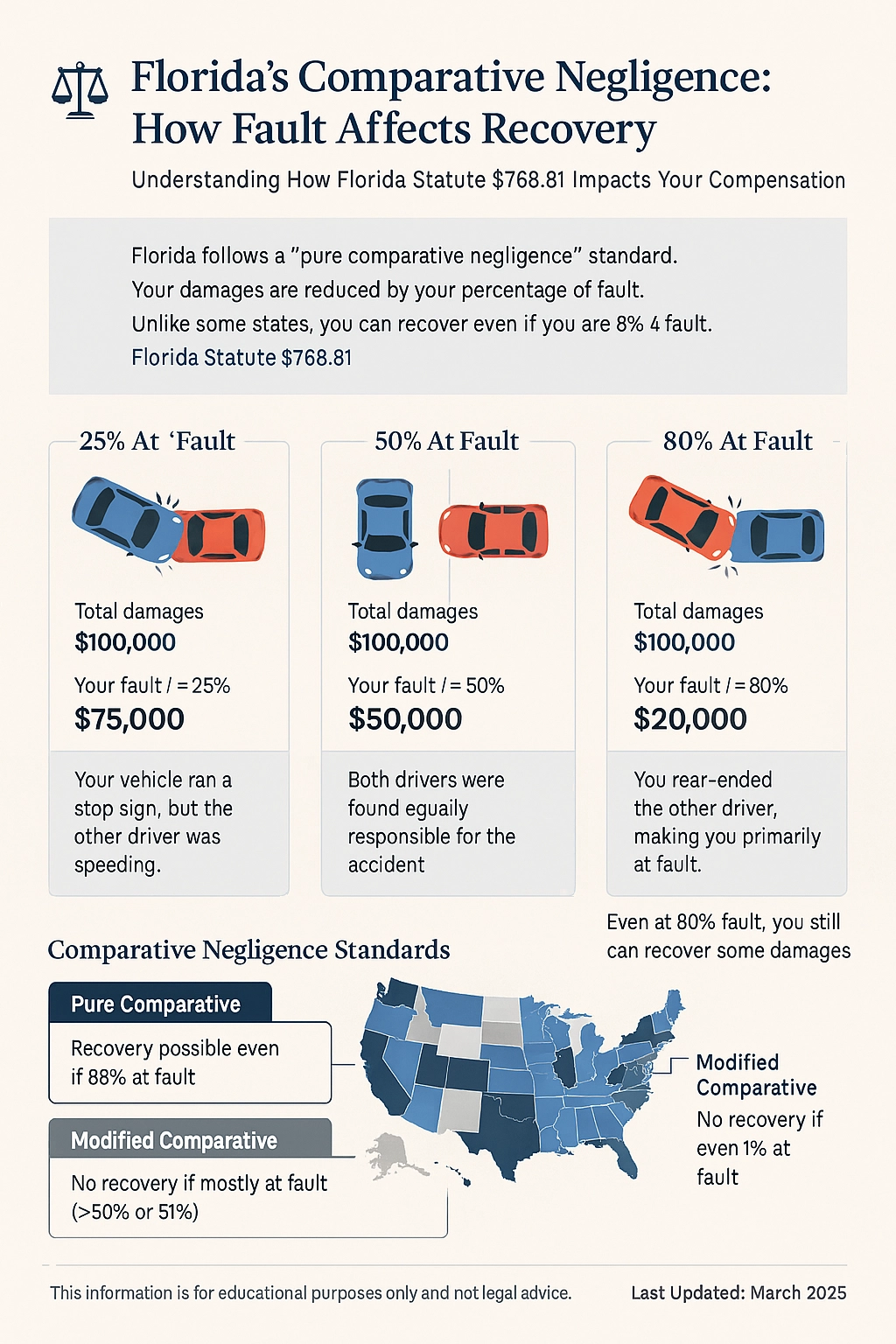
E-E-A-T Visualization Example
To effectively demonstrate the connection between YMYL and E-E-A-T concepts, include a visual representation that shows how these frameworks interact in the legal content context.
Technical SEO Considerations for YMYL Legal Content
1. Site Structure and Navigation
Law firms should organize content by practice areas and subtopics, creating pillar pages for main practice areas supported by related cluster content. Implement clear breadcrumb navigation and ensure logical internal links between related content. This structure not only enhances user experience but also helps search engines understand the relationship between different content pieces on your site.
Effective law firm SEO begins with proper site architecture that makes it easy for both users and search engines to navigate your content. Consider implementing a hub-and-spoke model where main practice area pages (like personal injury or estate planning) serve as central hubs linking to more specific subtopic pages.
2. Mobile Optimization
Ensure responsive design across all devices and prioritize fast loading times (under 3 seconds). Make contact information easily accessible on mobile and optimize forms for mobile completion. Mobile optimization is not only a ranking factor but also crucial for serving potential clients who may be searching for legal services in urgent situations using mobile devices.
3. Site Security and Trust Signals
Maintain SSL certification (HTTPS), implement secure contact forms for client inquiries, and include trust indicators such as Florida Bar membership badges. Display client testimonials (with appropriate disclaimers) and showcase professional affiliations and recognitions. These elements contribute to the overall trustworthiness of your site from both user and search engine perspectives.
4. Local SEO Optimization
Create and maintain Google Business Profile with accurate information and establish consistent NAP (Name, Address, Phone) across online directories. Develop location-specific pages for multiple office locations and include structured data markup for attorneys and local business. Local SEO is particularly important for law firms as most legal queries have local search intent.
For law firms looking to attract new clients in specific geographic areas, local SEO becomes an important ranking factor. Ensure your firm’s website includes city-specific pages with relevant local information, and build citations in legal directories to strengthen your local search presence. Law firm marketing that neglects local SEO misses critical opportunities to appear in relevant search results.
5. Link Building and External Authority
Strategic link building from reputable sources helps establish your firm’s website as an authority in the legal industry. Focus on obtaining quality external links from bar associations, legal publications, educational institutions, and industry organizations.
Guest posting on respected legal blogs, participating in legal webinars, and creating shareable resources can all generate valuable backlinks that enhance your search rankings while building your reputation in the legal community.
Content Types That Demonstrate E-E-A-T for Florida Attorneys
1. Explanatory Content
Develop step-by-step guides to Florida legal processes, explanations of recent legal developments, and comparative analyses of Florida law versus other jurisdictions. This type of content showcases your expertise while providing practical value to potential clients.
[VISUAL PLACEMENT #7: Insert content type comparison chart here]
2. FAQ Resources
Create comprehensive FAQ pages addressing common client questions, practice area-specific FAQ sections, and “Ask an Attorney” features with real questions (anonymized). FAQ content directly addresses client concerns while providing opportunities to demonstrate your knowledge and expertise.
3. Case Analysis
Provide breakdowns of significant Florida court decisions, implications of recent rulings for specific client situations, and trends in Florida case law in your practice area. This analytical content demonstrates both expertise and experience with the subject matter.
4. Blog Posts and Articles
Regular blog posts on your firm’s website serve multiple purposes: they keep your content fresh, address timely legal topics, demonstrate ongoing expertise, and create opportunities for internal linking. Aim to publish blog articles at least monthly, focusing on topics relevant to your practice areas and answering questions your target audience is actually searching for.
Blog posts can range from straightforward explanations of legal concepts in accessible language to in-depth analysis of complex legal issues. They also provide an opportunity to showcase your firm’s personality and approach to client service.
5. Practice Area Pages
Comprehensive practice area pages are essential for both user experience and search engine optimization. Each practice area page should include:
- Clear explanation of the legal issue
- How your firm approaches these cases
- Relevant Florida statutes and case law
- Client testimonials specific to this practice area
- FAQ section addressing common questions
- Clear call to action (such as scheduling a free consultation)
By developing deep, informative practice area pages rather than thin overviews, you demonstrate both expertise and commitment to educating potential clients.
Measuring Success: Beyond Search Rankings
Success metrics for YMYL legal content should include user engagement metrics such as time on page, pages per session, bounce rate, and return visitor rate. Tools like Google Analytics can help track these important indicators of content quality and relevance.
Also track conversion metrics including contact form submissions, consultation requests, resource downloads, and newsletter signups. These metrics directly connect your content strategy to business outcomes and new clients.
Reputation metrics are equally important for YMYL content, including client testimonials, online reviews, professional endorsements, and media mentions. These comprehensive metrics provide a more complete picture of your content’s effectiveness than organic search results or rankings alone.
Consider implementing Google Search Console to monitor how your pages appear in search results, identify opportunities for improvement, and track search performance over time.
Content Self-Assessment Framework for Florida Attorneys
To ensure your YMYL legal content meets both ethical standards and quality guidelines, regularly evaluate it against the following criteria adapted from Google’s self-assessment framework:
Quality and Substance Assessment
Original Value: Does your content provide original information, reporting, research, or analysis based on your Florida legal practice experience?
Comprehensiveness: Does your content offer a substantial, complete description of the legal topic that addresses Florida-specific considerations?
Insightful Analysis: Does your content provide analysis that goes beyond obvious information, incorporating nuanced understanding of Florida law?
Added Value: If your content references other legal sources, does it avoid simply copying those sources and instead provide substantial additional value through your expertise?
Presentation Quality: Is your content well-produced, edited for clarity and accuracy, and free from stylistic or spelling issues?
Descriptive Headings: Do your page titles and headings provide clear, helpful summaries without exaggeration or sensationalism?
Shareability: Is your content valuable enough that Florida residents would want to bookmark, share, or recommend it?
Authoritative Quality: Does your content have the depth and quality you would expect to see referenced in a legal textbook, law review article, or bar journal?
Comparative Value: Does your content provide substantial value compared to other law firms’ pages in search results addressing similar Florida legal topics?
By regularly conducting this self-assessment, you can identify areas for improvement and ensure your content maintains the highest standards of both ethical compliance and quality.
Implementing AI-Assisted Content Creation Responsibly
As law firms increasingly explore AI tools for creating content, it’s essential to understand how to use these technologies responsibly while maintaining compliance with both ethical guidelines and YMYL quality standards:
Florida Bar Guidance on AI
The Florida Bar’s Ethics Opinion 24-1 provides important guidelines for attorneys using generative AI. When creating YMYL content with AI assistance:
- Maintain confidentiality: Research the AI program’s policies on data retention, data sharing, and self-learning before inputting any sensitive information.
- Retain responsibility: Remember that you remain professionally responsible for all content published under your name, regardless of how it was generated.
- Verify accuracy: Develop procedures to verify that AI-generated content about Florida law is accurate, current, and compliant with ethical obligations.
- Ensure proper attribution: When using AI for drafting, maintain appropriate authorship attribution of the content to the responsible attorney.
- Add appropriate disclaimers: If using AI chatbots on your website, include clear disclaimers indicating they are AI programs, not lawyers.
Best Practices for AI-Assisted Legal Content
When using AI to help create YMYL content for your Florida law practice:
- Provide detailed prompts: Include specific references to Florida statutes, cases, and procedures to ensure relevant, jurisdiction-specific content.
- Human review is mandatory: Always have a qualified Florida attorney thoroughly review and edit all AI-generated content before publication.
- Add experiential insights: Enhance AI-generated content with your personal case examples and practical insights from Florida practice.
- Verify all legal citations: Independently verify any statute citations, case references, or procedural information suggested by AI tools.
- Maintain voice authenticity: Edit AI-generated content to reflect your firm’s authentic voice and perspective on legal matters.
When implemented responsibly, AI can help law firms create more comprehensive YMYL content while allowing them to focus their expertise on the most complex and nuanced aspects of legal guidance.
Conclusion: The Ethical Advantage
For Florida attorneys, the convergence of ethical requirements and YMYL content standards creates a unique opportunity. By producing content that adheres to both frameworks, you not only fulfill your professional obligations but also position your firm for greater visibility in relevant search results.
The most successful law firm’s websites will be those that provide genuinely helpful, specialized information; clearly communicate attorney credentials and expertise; maintain scrupulous accuracy and currency in legal content; balance marketing objectives with ethical requirements; and prioritize user experience and accessibility.
Working with an experienced SEO company that understands both legal industry requirements and search engine optimization can help you develop a comprehensive strategy that achieves these goals. Whether you handle your digital marketing in-house or partner with specialists, maintaining the focus on creating value for potential clients rather than simply chasing search rankings will yield the best long-term results.
By viewing E-E-A-T not as an SEO challenge but as an extension of your professional commitment to ethical practice, you create a sustainable online presence that serves both your firm and your potential clients.
This guide is intended for informational purposes only and does not constitute legal advice. Florida attorneys should consult The Florida Bar’s rules and guidelines for specific requirements regarding attorney advertising and online communications.

